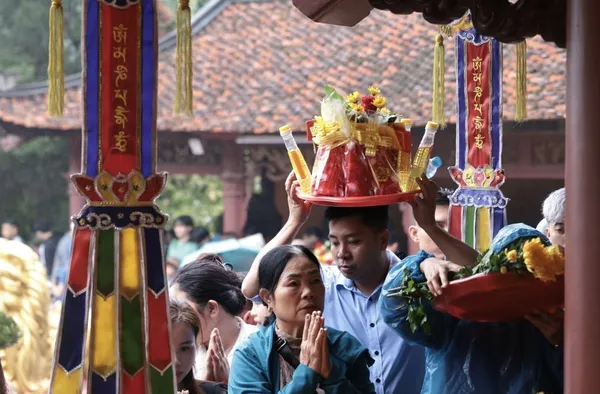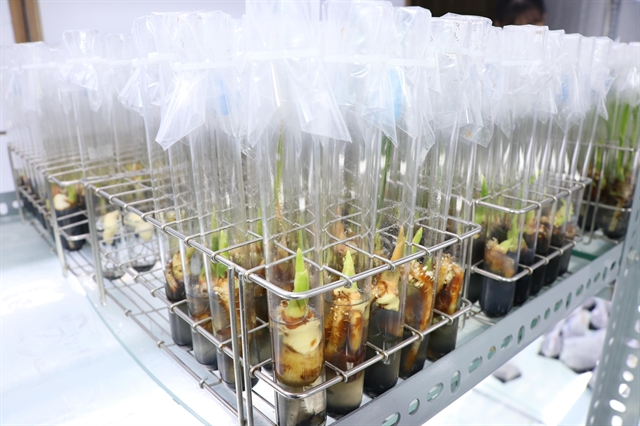 Economy
Economy


|
| Embryo-cultured wax coconuts at the faculty of agriculture and fisheries, Trà Vinh University, Vĩnh Long Province. VNA/VNS Photo |
VĨNH LONG – Trà Vinh University in Vĩnh Long Province has made significant strides in recent years in scientific research and technology transfer, particularly in agriculture, enabling farmers in the Cửu Long (Mekong) Delta to enhance productivity and incomes.
One of its most notable achievements is the successful propagation of wax coconut through embryo culture, a breakthrough that has multiplied yields compared with traditional varieties.
With a strong entrepreneurial spirit and the ambition to develop their hometown’s speciality, in 2010, Đinh Thị Thanh Tâm and her husband, Đặng Minh Bé, of Song Lộc Commune shifted careers to grow the fruit on a one-hectare plot of family land.
A former lecturer in the faculty of agriculture and fisheries at Trà Vinh University, she possessed solid expertise in propagation techniques.
Combining her academic knowledge with practical experimentation, the couple gradually built up a thriving garden capable of producing more than 1,000 coconuts a month.
By 2015 they had expanded their grove to four hectares with 800 trees.
Their years of persistence and experimentation paid off: today, their orchard achieves a wax fruiting rate of up to 94 per cent per bunch, an unprecedented success rate compared with the traditional maximum of 25 per cent.
On average, it yields 1,000–1,600 fruits per hectare monthly. With market prices at VNĐ80,000-120,000 (US$3.20–4.80) per fruit, the couple earns around VNĐ6 billion (US$240,000) a year.
But not content with cultivation alone, Bé and Tâm ventured into processing.
In 2022 they set up the Phát Đặng One Member Co., Ltd., investing over VNĐ15 billion (US$600,000) in a modern facility equipped with Italian ice cream machines, freeze dryers, cold storage, and standardised workshops.
It now produces three OCOP three-star products, fresh wax coconut, wax coconut ice cream and wax coconut jam, which are distributed nationwide through supermarkets, convenience stores and rest stops.
These products are currently undergoing evaluation for an upgrade to four-star certification and geographical indication protection.
Each month, the company outputs more than 10,000 coconuts, with 80 per cent serving its own processing needs.
It also operates a nursery, selling 15,000–20,000 embryo-cultured seedlings annually at VNĐ800,000 (US$32) per tree.
In addition to providing technical guidance, it signs purchase contracts with local farmers to ensure stable output and fair pricing.
The business currently employs 30 workers, more than 30 per cent of them Khmer people, who are paid VNĐ5.5-18 million (US$220–720) a month, and in excess of VNĐ20 million (US$800) during peak periods.
According to Tâm, fruits propagated by embryo culture produce flesh that is soft to the shell, making them particularly suitable for processing.
Demand far outpaces supply.
“Every day our company requires about 1,000 coconuts, but we can only get around 300.
“That is why we are seeking to partner with more growers to secure stable inputs for production.”
Wax coconut, a famed speciality of Vĩnh Long Province, cannot naturally germinate due to its genetic traits, and traditional propagation methods only achieve a maximum wax rate of 25 per cent per bunch.
To overcome this, Trà Vinh University developed embryo culture techniques that boost the fruiting rates to over 85 per cent.
Commercialised since 2011, the technology has supplied farmers with 5,000–8,000 seedlings annually at VNĐ700,000–800,000 (US$28–32) each.
Nguyễn Ngọc Trai, deputy head of the university’s faculty of agriculture and fisheries, said the institution prioritises applied research to directly serve farmers.
For wax coconut propagation, scientists have continuously refined embryo culture methods to improve quality and consistency.
Beyond this, the university is working on plant tissue culture techniques, expected to produce seedlings with high genetic uniformity and much lower costs, widening access for farmers and paving the way for export.
Once commercialised, tissue-cultured seedlings could be sold for under VNĐ100,000 (US$4) each as against the current VNĐ700,000–1.2 million (US$28–48) for embryo-cultured varieties.
Vĩnh Long Province currently has over 1,360 hectares of wax coconut, with 31 hectares planted using embryo-cultured seedlings.
The province aims to expand to 1,500 hectares by 2030.
Successful tissue culture propagation will help farmers rejuvenate ageing, low-yield orchards, improving productivity and household incomes.
According to Lê Văn Đông, deputy director of the province's Department of Agriculture and Environment, ensuring stable markets and sustainable livelihoods for farmers requires greater investment and enterprise participation.
“We prioritise attracting companies with strong processing technologies to invest in the locality, creating high-value products for both domestic and export markets.”
Alongside this, the province is zoning cultivation areas, promoting organic and VietGAP and GlobalGAP standards, and encouraging farmers to adopt advanced scientific techniques. – VNS